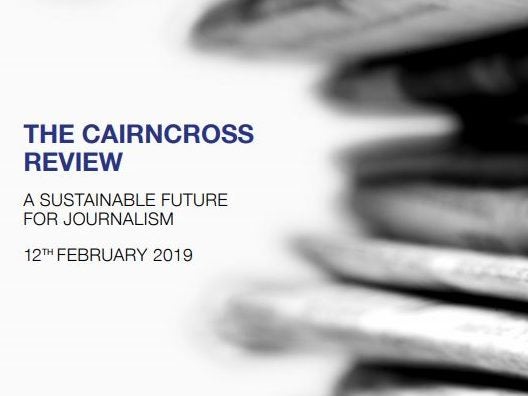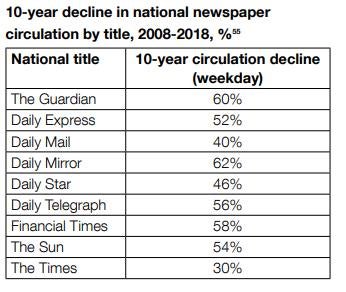
The Cairncross Review into a sustainable future for high-quality journalism made nine proposals to save the news industry, but here some other aspects of the report you might have missed.
The review was commissioned by the UK Government and led by Dame Frances Cairncross. It published its findings last week.
Read the full Cairncross review report here.
Who is Dame Frances Cairncross?
Dame Frances Cairncross is a former economics journalist for the Guardian and senior editor at The Economist. She is the former head of Exeter College, Oxford University, and is currently chairman of the body that oversees Heriot-Watt University. She was made a Dame of the British Empire for services to education in 2014 and is married to financial journalist Hamish McRae.
Cairncross Review advisory panel members:
- Jo Adetunji – deputy editor at The Conversation UK
- Geraldine Allinson – chairman of KM Media Group
- Azeem Azhar – runs Exponential View newsletter
- Polly Curtis – former Huffpost UK editor-in-chief
- Ashley Highfield – former Johnston Press chief executive
- Douglas McCabe – Media analyst
- Akshat Rathi – reporter at Quartz
- Matt Rogerson – head of public policy at Guardian Media Group
- Mimi Turner – brand strategy consultant for media publishers
- Stephen Woodford – chief executive of the Advertising Association
- Peter Wright – editor emeritus of Associated Newspapers (publisher of the Mail titles and Metro)
Key figures in report
- Print sales of national and local printed newspapers have fallen by roughly half between 2007 and 2017
- Nationals have fallen from 11.5m daily copies in 2008 to 5.8m in 2018
- Locals have fallen from 63.4m weekly copies in 2007 to 31.4m in 2017
- Print advertising revenues have fallen by 69 per cent in a decade
- The number of frontline journalists in the industry fell from about 23,000 in 2007 to 17,000 in 2019 (Mediatique)
- The BBC received £3.8bn from the licence fee in 2017/18, part of which is used to deliver high-quality journalism
- In 2018, 74 per cent of UK adults said they looked at news online each week, increasing to 91 per cent of 16-24-year-olds, with 66 per cent using TV, 39 per cent printed newspapers and 34 per cent radio (Reuters Institute)
- The proportion of UK adults using print news each week has fallen from 59 per cent of the adult population in 2013 to 36 per cent in 2018, and an even faster fall for those aged under 35 (Reuters Institute)
- Only one person in ten in the UK now reads a regional or local printed paper each week.
 (source: ABC)
(source: ABC)

Dane Frances on what defines high-quality journalism…
- “Two areas of public interest news that matter greatly. Each is often of limited interest to the public, but both are essential in a healthy democracy.
“One is investigative and campaigning journalism, and especially investigations into abuses of power in both the public and the private sphere. Such journalism is particularly high-cost and high-risk.
“The second is the humdrum task of reporting on the daily activities of public institutions, particularly those at local level, such as the discussions of local councils or the proceedings in a local Magistrates Court.
“Reporting on the machinery of government and justice matters at a national level too, but it is in greater danger locally, mainly because the size of the potential audience for local issues is so much smaller, and thus inevitably attracts less financial support from readers.”
On the press…
- “The press is not required to be politically impartial, and so newspapers can offer a greater diversity of viewpoints and opinions.
“Because of its hard-won position as a powerful institution independent of the state, the published press is more likely to be a check on holders of power.
“Moreover, the press has invested more money and skilled journalists into news gathering than broadcasters have done.”
- “Traditional print newsbrands contribute by far the biggest share of all editorial content costs” across publishers, broadcasters and digital natives, a report by Mediatique shows
- Newspaper publishers are responsible for half of all frontline journalism costs in the UK
- “Newspapers, in other words, still play the central role in financing the creation of original journalism, accounting for as much as broadcasting and online put together.
“Thus, broadcasters are more likely to carry news stories that have first appeared in newspapers, rather than vice versa. This is even more so the case for local news.
“Local newspapers tend to cover a specific town or local area, whereas broadcasters tend to be regional, and so they frequently draw upon local newspapers as a source for local news stories with wider implications.
“…this makes local newspapers a particularly important component of overall national news coverage.”
- “The news industry… plays an important democratic function that supports participation in local and national society, and safeguards the public-interest by reporting on the activities of the powerful and the workings of the state.”
- “By far the largest number of responses to the call for evidence came from members of the public who argued that the review should not recommend giving money to news publishers.”Some claimed that newspapers merely purveyed political propaganda for their wealthy owners. Many deplored the reluctance of most newspapers to implement the provisions of the Leveson Inquiry and the subsequent cancellation of the Inquiry’s second stage.”
Investigative journalism costs
- The Times investigation into alleged sex abuse by Oxfam charity workers cost £48,000 and lasted ten months
- The Sun spent £73,000 on an investigation that was not published because it failed to meet the evidence threshold for publication
- The Independent set out its predicted costs for a dedicated investigations team as half-a-million- pounds a year, including a £100,000 salary for a head of investigations/editor and £50,000 each for the team
- The Bureau of Investigative Journalism said its overall budget for investigative journalism is £1.2m, which covers about 32 investigations
Journalism and local democracy
- Court reporting in the four years from 2012 to 2016 had dropped by 30 per cent in the national press and 40 per cent in the regional press (study by Brian Thornton, Winchester University)
- “Two large-scale US academic studies have found that the presence of one or more local newspapers keeps local authorities in check and makes them more efficient, partly by auditing their spending and generally by acting as a watchdog.”
- UK academics Martin Moor and Gordon Ramsay say journalists act as a “scarecrow”. “The very existence of journalists, they argue, who might investigate and write about abuses of power, acts as a threat that keeps the powerful in check”. A local paper’s role is not just to inform but to “increase engagement in the political process” and “encourage better management of local finances”.
- Research by Rachel Howells into Port Talbot, where the Port Talbot Guardian closed in 2009, found that when journalists aren’t based in the town and don’t cover it in the depth they once had there is a decline in measures of democratic and civic engagement. Said the report: “…the mere survival of a local title may not be enough to safeguard the democratic and civic engagement if the journalists who fill its pages no longer work close by”.
- Cairncross says it “seems improbable” that the market might eventually provide the resources to bolster local democracy reporting , “if only because reader interest is unlikely to generate the revenues”.
The BBC
- The BBC remains “by far the most widely used individual news source for UK audiences”.
- 74 per cent of radio news consumers say they use a BBC station to listen to news
- The BBC is the most-visited news website with 43 per cent of adults using it each month (Reuters Institute)
- The BBC is the most followed news brand on Facebook, Twitter and Instagram (Ofcom)
- BUT, 66 per cent of UK adults use four or more sources of news (Ofcom)
- Only 14 per cent of UK adults rely on the BBC as a source of news (Reuters Institute)
- “This suggests that the majority of news consumers use multiple sources and that the BBC is a large – but not the only – player in an increasingly crowded news market.”
- BBC News attracted 30m UK users a week in 2017
Social media and news aggregators
- “Google and Facebook are the two biggest online sites in the UK, used by over 80 per cent of adults each month (UK Online Measurement)
- In September 2018, an estimated 10.9m UK adults used the Apple News app on their phones – 22 per cent of all UK adults online (UKOM)
- “Although smaller by comparison than the number using Google or Facebook in the UK, Apple remains one of the biggest online platforms overall, and its news platform may grow over time.”
- “[Google’s] algorithm gives more credence to a story for which it can find a number of different sources. For example the special investigation by The New York Times into Donald Trump’s involvement in suspect tax schemes was not originally surfaced by Google, as The New York Times was the only publisher online carrying this particular story.”
- “In the UK, 24 per cent of adults say they reach news through online search such as Google and Google News, and 39 per cent of adults say they use social media such as Facebook and Twitter as a source of news each week.”
Advertising
“In 2007, advertising in the national and local press brought in £4.6 billion, and accounted for 40 per cent of total UK advertising spend.111 In 2017, the share of advertising appearing in the printed press had fallen from 40 per cent to 12 per cent, and generated £1.4 billion in expenditure – a fall of 70 per cent compared to 2007.”
“Over the same period, revenue from print circulation has also declined, although less dramatically. In 2007, sales brought in an estimated £2.2 billion of revenue. The estimated sales revenue for 2017 had dropped to £1.7 billion. Overall, revenues from advertising and sales of printed newspapers have dropped by 50 per cent between 2007 and 2017.”
Email pged@pressgazette.co.uk to point out mistakes, provide story tips or send in a letter for publication on our "Letters Page" blog
